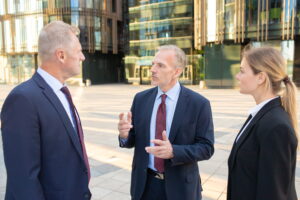
How to communicate with an employer in Germany: rules and business etiquette
Ethics and culture of business communication in Germany 📌 Traditions and etiquette when working with an employer ➡️ Key rules of conduct with management and colleagues
As soon as Russia’s war against Ukraine began, a large number of refugees chose the countries of the European Union as their place of residence. This was the reason why a large number of Ukrainian citizens ended up in Germany. It was this country that was able to provide refugees with everything they needed – housing, social benefits, the opportunity to get a job and become a full-fledged part of the local society.
The impact of a large number of immigrants on the demographics in Germany was difficult to ignore. This influenced local citizens’ perceptions of migration challenges. It is worth taking a closer look at how the presence of Ukrainian citizens on the territory of this state affects social processes within society.
The overall picture is good. The majority of residents in Germany belong to refugees from Ukraine positively. Especially if we draw parallels with examples of migration from other states. This was influenced by several important factors:
Surveys show that 52% of Germans believe that Ukrainians are capable of fulfilling an important economic mission – working to improve local budgets. A very large number of people who moved to the country already have qualifications in various areas and, in accordance with them, find jobs. This has a direct impact on the overall financial picture.

Of course, there are those people who are quite critical of migration policy, since they may have certain problems with business or at home. However, the overall picture is that people are well aware of all the advantages and challenges that they will face due to the significant number of migrants.
There are several factors that influence how Germans treat Ukrainians who move to their country for long-term residence:
Each of them is worth considering in more detail for a better understanding of how Ukrainian migrants are perceived in this country.
A very important factor influencing the perception of Ukrainians in Germany is the very high level of education. People easily find work and statistics show this, because more than 18% of Ukrainian refugees were able to not only find work, they work in their specialty. Of these people, about 44% plan to remain in Germany in the future. This means that even if the war ends suddenly, it will not cause a gap in local budgets due to labor shortages. In the coming years, these migrants will not move anywhere and will continue to work for the country’s economy. However, there are concerns about the treatment of Ukrainian refugees in Europe due to the strain on social systems. These include social benefits, or the opportunity to obtain temporary housing.
Time is the main indicator of how ready migrants are to strengthen their positions in Germany. For Ukrainian immigrants, education does not become a problem; they send their children to local schools and universities with great pleasure, but one can see the number of problems, at least in the fact that there are a number of cities where a certain percentage of the population has Russian roots, which leads to unpleasant situations in institutions. That is why the perception of Ukrainian refugees varies, depending on the specific city and region.
In Germany, there are constantly political discussions that relate to the issue of integration of residents in other states. There are parties such as the CDU whose leaders continue to use the migrant issue to promote their interests at the highest level. This, in turn, can create certain difficulties for displaced people, because they depend in a certain way on what laws the government will pass.
Pro-Kremlin parties such as the Alternative for Germany continue to exist because they have not been removed from the political map. These officials often question why there are so many Ukrainian refugees in the country, as they believe it creates problems for the local population. They rarely use the information to create contextual media coverage. However, the main political force has a positive attitude towards migrants in Germany.
Waves of Ukrainian migrants are bringing changes in Germany in terms of the demographic situation. Thus, a large number of refugees and migrant women replacing the Germans will to some extent contribute to the rejuvenation of the population of the community, which is tolerant of different cultures, which will be beneficial for social development. However, it will not be easy for the local population, since a large concentration of Ukrainian refugees will require financial, practical and intellectual advances that will allow these people to be integrated into Germany.
It is much easier to make a forecast as to what the attitude of the Germans will be towards the Ukrainians who “don’t really” come, but only go on vacation or study, and also come here only to visit for a maximum of a month. All this will depend on the integration program in Germany, the importance of economic growth and the general political issues of the country. That is, everyone needs to try to prove that they are ready to be useful to society and provide for their lives in the country.